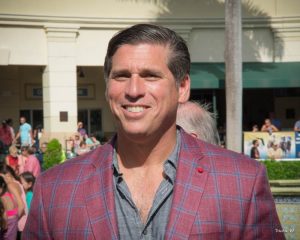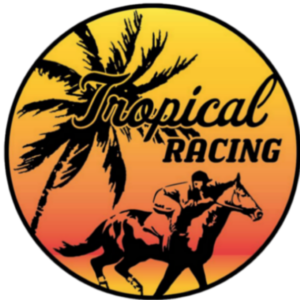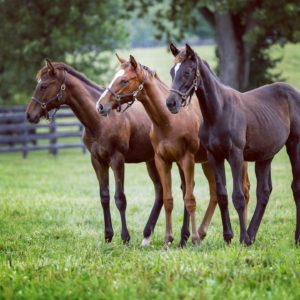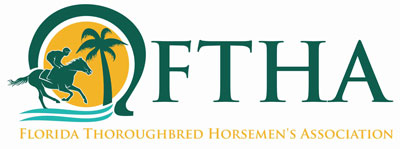 Talk to Troy Levy for more than five minutes, and he will say it. “I love this game.” During the course of an hour-long conversation he’ll say it at least a half dozen times. He hopes that his unrestrained enthusiasm for horse racing is contagious.
Talk to Troy Levy for more than five minutes, and he will say it. “I love this game.” During the course of an hour-long conversation he’ll say it at least a half dozen times. He hopes that his unrestrained enthusiasm for horse racing is contagious.
“I honestly think the Thoroughbred racing industry is the best, it’s great to be involved in it,” Levy said. “I am always trying to think of ways to bring new people into the game, and we have had a decent amount of success in doing that. Tropical Racing has had a few dozen new owners who’ve never owned horses, some who had never even been to the racetrack before.”
Levy started Tropical Racing in South Florida in late 2016 and, less than two years later, he was elected to the Board of the Florida HBPA. But he was no newcomer to the sport. The Long Island native has been a member of the racing community since he was a teenager.
It all started when a neighbor acquired an interest in a harness horse, and invited Levy and his father to be his guests at Roosevelt Raceway. The connection was immediate.
“Somehow, with horses, they get into your soul,” Levy said. “Just walking into the barn, actually touching a horse – that was it. As we were driving home, I said, ‘Hey, Pop, can we go back next weekend?’”
The then-13-year-old would help out on visits to the barn with his father and their neighbor. In short order, he began spending several hours a day at the track on weekends. The trainer had a small stable, and was happy to have an extra pair of hands.
“My dad would drop me off in the morning and pick me up in the afternoon, and the trainer was great about letting me hang around,” Levy recalled. “He let me sit beside him on the jog cart, he taught me how to walk horses, how to groom. I kept getting more and more involved.”
As soon as he was old enough, the budding horseman started working at the track on weekends and school vacations. He spent one summer living in a tack room at Yonkers Raceway.
“My parents weren’t nuts about that, but I was so fascinated with racing,” Levy said. “I’d listen to the blacksmith talk about shoeing, I’d drive around with the vets and watch them work. I’d talk to the old grooms – I was intrigued by the old school ways of taking care of the horses. I was taking it all in, learning anything I could about the racing industry.”
After high school, Levy did enroll at Long Island University, but after just one year, he broke the news to his parents that he did not want to complete his degree.
“Every day I was at college, I just wanted to be at the racetrack,” he said. “I didn’t want to be anywhere else. I told my parents, and they really weren’t surprised. They were actually pretty cool about it. My dad always preached, ‘Do what you love,’ and they knew how much I loved racing. They were comfortable that I could make a living at it.”
Through his 20s, Levy did make a career in harness racing as an owner, trainer and driver. He still counts driving his first winner, Cameocomp, at Pompano Park in 1991 as his most memorable moment in the sport. But he hopes the best is yet to come.
 Levy took a hiatus from racing after getting married and starting a family. One of his harness racing clients was a senior vice president at Prudential, and encouraged him to give the stock market a try.
Levy took a hiatus from racing after getting married and starting a family. One of his harness racing clients was a senior vice president at Prudential, and encouraged him to give the stock market a try.
“My initial reaction was ‘absolutely not!’,” Levy said. “I was where I wanted to be, and I was doing pretty well at it. But I was also traveling back and forth, Florida in the winter, New York and New Jersey in the summer. With a family coming, I realized that I needed to be in one place for my kids. But when I left the industry, I always knew I’d be back.”
Instead of going to work at Prudential, Levy answered an ad in the Sun-Sentinel. He needed a month to disperse his stable, but took that time to study for the Series 7 exam required of all stock brokers. He passed the test in his first try, and hit the ground running.
“I learned the job just like I learned about racing,” he said. “I tried to gain as much knowledge and information as possible.
“It came a little more naturally than I had anticipated because of the years I spent handicapping races,” he added. “Handicapping is analyzing the form to figure out what horse will do better on that day; as a stock broker, you do research on companies to figure out which will perform best.”
Levy stayed in the financial industry “way too long,” waiting until daughter Miranda and son Gavin had graduated college before getting back into the game he really loved. As had always been the plan, when he returned, his focus was on Thoroughbred racing.
“Even when I worked with the Standardbreds, all my free time was spent at Thoroughbred racetracks,” he explained. “I’ve always loved the Thoroughbreds, I love how fast they go, I love that, as an athlete, they leave everything out on the racetrack. That just blows me away.”
The timing wasn’t quite right when Levy started his first small syndicate. It was 2008, and shortly after the partnership launched, the economy crashed. Levy stayed involved on a small scale, owning a few horses over the next eight years before unveiling Tropical Racing five years ago.
“The casinos were attaching themselves to racetracks, the tracks were participating in those revenue streams, sports wagering was on the horizon,” he said. “I thought that purses would be exploding, while people were breeding fewer horses. The valuation of horses had to go up. I took my knowledge of the investment industry and used it to start Tropical Racing.”
 Levy wanted his partners to experience “everything the game has to offer, every revenue stream, all under one roof.” The business evolved to include not only buying and racing, but also pinhooking, consigning and breeding. The expansion continued in the spring of 2019 with the purchase of a farm in Versailles, Kentucky. The broodmare band has grown from just two to 24. Homebred Yafa became the first stakes horse for Tropical’s breeding division when running second in the Juvenile Fillies Turf Stakes at Gulfstream Park West last November.
Levy wanted his partners to experience “everything the game has to offer, every revenue stream, all under one roof.” The business evolved to include not only buying and racing, but also pinhooking, consigning and breeding. The expansion continued in the spring of 2019 with the purchase of a farm in Versailles, Kentucky. The broodmare band has grown from just two to 24. Homebred Yafa became the first stakes horse for Tropical’s breeding division when running second in the Juvenile Fillies Turf Stakes at Gulfstream Park West last November.
“The progression of turning an idea into reality has worked out really well,” Levy said. “Next foaling season, God willing, we will have just under 75 horses for Tropical.”
The operation maintains a 15-horse stable at Gulfstream Park. Levy’s daughter works as his executive assistant, and his son, who spent time as a groom and assistant trainer, now manages the social media and marketing. While some of the focus has shifted out of state, Florida is still very much home.
“I love Florida racing,” Levy said. “This is where I live, it’s where we got started in the Thoroughbred game.”
When approached to run for the FHBPA Board in 2018, he didn’t hesitate.
“I really wanted to get involved, because I truly love this game,” he said. “I was a little bit nervous for Florida racing – that hasn’t really changed – and I thought I could help with communication between the horsemen and the executives at the racetrack.
“We need to make Florida racing more competitive, and more transparent, as transparent as possible,” he continued. “And we need to do what we can to improve the health of the industry while looking out for the individuals – the owners and breeders and trainers, the backstretch workers, the jockeys, and the horses.”
Levy is still very much hands-on with the horses. His day starts at 4:30 or 5 a.m., and he spends as much time in the barn as he does on conference calls and attending the sales.
“I started in racing, and now I’m back to doing what I love,” he said. “That’s how I came up with the name for our farm. Tropical owns 100% of the business, but we wanted to have an identity for the new division when we expanded. I came up with Circle 8 because 8 is the symbol for infinity, and because I have really come full circle in my life.”



